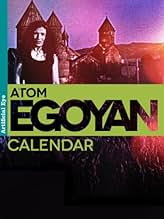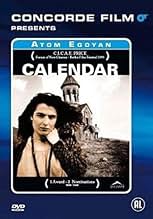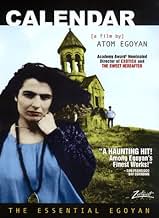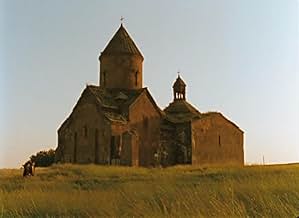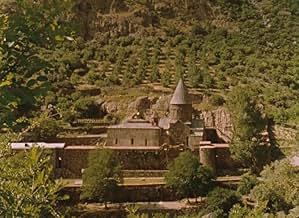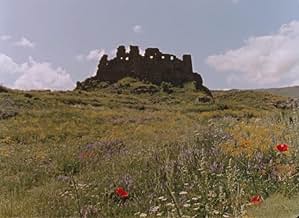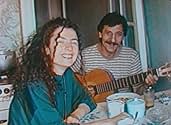Calendar
- 1993
- Tous publics
- 1h 14m
IMDb RATING
6.7/10
2.5K
YOUR RATING
A woman stays in Armenia after her photographer husband completes his assignment and returns home to Canada.A woman stays in Armenia after her photographer husband completes his assignment and returns home to Canada.A woman stays in Armenia after her photographer husband completes his assignment and returns home to Canada.
- Awards
- 1 win & 2 nominations total
- Director
- Writer
- All cast & crew
- Production, box office & more at IMDbPro
Featured reviews
The photographer behind the camera (Atom Egoyan) and his translator (Arsinée Khanjian) are touring Armenian religious sites with a driver/guide. They are taking pictures for a calendar. The movie alternates between that and the photographer repeatedly having the same date with different women in his home. He pours the rest of the wine, the woman asks for a phone, he writes in his notebook, and she talks on the phone in a foreign language next to the calendar.
The Armenia half is a little interesting. At least, there are interesting sites. After about twenty minutes, the repetitive nature is well established and I just want the plot to advance. The reveals are interesting although way too slow. The phone reveal is fun but there is little or no tension. This would be more compelling if the second half can be condensed and something more dramatic happens. It's already at an odd running time. It's open-ended and feels incomplete. Egoyan is probably working through some stuff with his Armenia heritage and his relationships. It's not a movie for the masses but maybe for his fans.
The Armenia half is a little interesting. At least, there are interesting sites. After about twenty minutes, the repetitive nature is well established and I just want the plot to advance. The reveals are interesting although way too slow. The phone reveal is fun but there is little or no tension. This would be more compelling if the second half can be condensed and something more dramatic happens. It's already at an odd running time. It's open-ended and feels incomplete. Egoyan is probably working through some stuff with his Armenia heritage and his relationships. It's not a movie for the masses but maybe for his fans.
There are moments in the film of sheer visual brilliance and even a fantastic narrative, though I doubt anyone could ever deny Atom Egoyan is a visually haunting artist. Between the various ruins and moments of real time captured on the trip making the film you see a true landscape, not only of the area, but of its people and what makes them who and what they are.
The problem is that with all that greatness are long moments of unneeded scenes or derivative exposition that remove the warm touching moments and at times just bore the ever loving crap out of you. Mind you I'm not anti art or art-esque films, it's just that these didn't really add a magical moment or create an air of mystery to the overall story or film.
I feel like the best part of the film was the Armenian man's story. The added problem here is that you only ever hear his stories second hand via the female translator, and they lack the dramatic impact he has when telling them, only you can't understand his words because there are no subtitles.
The 5 rating was mainly I just felt like everything good he captured he lost in being a tad pretentious.
The problem is that with all that greatness are long moments of unneeded scenes or derivative exposition that remove the warm touching moments and at times just bore the ever loving crap out of you. Mind you I'm not anti art or art-esque films, it's just that these didn't really add a magical moment or create an air of mystery to the overall story or film.
I feel like the best part of the film was the Armenian man's story. The added problem here is that you only ever hear his stories second hand via the female translator, and they lack the dramatic impact he has when telling them, only you can't understand his words because there are no subtitles.
The 5 rating was mainly I just felt like everything good he captured he lost in being a tad pretentious.
Not Atom Egoyan's most 'story-driven' film, but his best from a purely aesthetic/cinematic perspective. His use of non-linear chronology, repeated scenes that slowly give way to understanding, and long drawn out takes that let you really start to feel the moment (how many viewers start to notice the slight differences in the various sheep, or look for their birthdays on the pages of the wall-calendar?) puts this film close to the level of Tarkovsky, Angelopolous, Bresson, etc.
While "Exotica" and "The Sweet Hereafter" are, understandably, his better known films (and good ones at that), "Calendar" works even better as the full realisation of theme and emotion using all the elements of cinema working in conjunction.
While "Exotica" and "The Sweet Hereafter" are, understandably, his better known films (and good ones at that), "Calendar" works even better as the full realisation of theme and emotion using all the elements of cinema working in conjunction.
'Calendar' is a slightly unusual film offering, written, filmed, directed, performed and possibly even fixed together with Scotch tape by Atom Egoyan, with this being my first trip into his cinematic world. It is a film that builds subtly, almost voyeuristically, so that the viewer finds themselves delving into the lives of its subjects to a level of prolonged discomfort, which reaches its crescendo as their true nature unfolds, all the while within some wonderful Armenian landscapes.
The plot concerns a Canadian-Armenian photographer returned to the land of his ancestors with the job of photographing his homeland's most picturesque churches for a forthcoming calendar. He is accompanied by his Armenian wife, acting as translator for the local driver and guide they have hired to provide them with background information on all the sites visited. The unassuming beginning suggests that this is more or less the sum-total of the film, but with every new location, we slowly learn of the deeply fragmented relationship present between the married couple and the cause of the ensuing distance between them. The way in which the film is shot helps to underscore this gulf, with the photographer never seen with his wife in the same place at the same time. Indeed, we only see him some time after the calendar has been printed, while we only see her during the photoshoot, very tellingly only in the company of the driver.
In some ways, 'Calendar' is rather difficult to watch, with the characters becoming more and more grotesque as the narrative progresses, especially that of the photographer, whose mounting jealousy (which could itself be described as a grotesque emotion) is exacerbated further by his unpleasant personality, particularly evident throughout scenes occurring in the present where, still emotionally in orbit around his estranged wife, he 'auditions' a long line of potential replacements (something that is not explicitly stated, so other viewers may have a different interpretation). Yet the film is shot in a very simple and effective way, which captures the claustrophobic mood of the piece while highlighting the wonderful natural backdrop. The camera is locked off in every scene, perhaps to mimic the still photography of the calendar itself, forcing the viewer to pay close attention to the tense and unspoken decay of the relationship. The still frame, accompanied by the subjects frequently in mid to long shot, further symbolize the distance felt by the man behind the camera and only serve to heighten his sense of isolation. These sequences are intercut with handicam footage of the characters' journey through Armenia, and yet despite providing the opportunity for motion, it is no more comforting, with the bluish tint and frequent lack of sound simply another form of isolation.
Egoyan is clearly a skilled photographer, and he lovingly captures the churches with the warmth and texture you would expect to see on a professional calendar. This only serves to heighten the contrasting coldness and unease created by the characters themselves, which Egoyan as the photographer and Arsinee Khanjian as the wife expertly create. It's certainly not a pleasant cinematic adventure, but anyone who has experienced that phase of a relationship will at least know the horrible awkwardness created between two people who were once close, and the helpless feeling of loss as a result. Unfortunately, drawn as he is, it is well-nigh impossible to sympathize with the protagonist's predicament, though his wife is by no means a victim.
The deeply personal discomfort, while real, does perhaps ensure 'Calendar' is probably not something I could sit through too often, but the effective minimalist approach on the production side and the jarring juxtaposition of cold, reserved knife-edge drama against the ultimately inconsequential polychromatic background has imbued a strong sense of the Atom Egoyan style. Certainly not a crowd-pleaser, but a director guaranteed to provoke thought. I'm certainly curious enough to explore some of his back catalogue some day. Actual rating 6 1/2 stars.
The plot concerns a Canadian-Armenian photographer returned to the land of his ancestors with the job of photographing his homeland's most picturesque churches for a forthcoming calendar. He is accompanied by his Armenian wife, acting as translator for the local driver and guide they have hired to provide them with background information on all the sites visited. The unassuming beginning suggests that this is more or less the sum-total of the film, but with every new location, we slowly learn of the deeply fragmented relationship present between the married couple and the cause of the ensuing distance between them. The way in which the film is shot helps to underscore this gulf, with the photographer never seen with his wife in the same place at the same time. Indeed, we only see him some time after the calendar has been printed, while we only see her during the photoshoot, very tellingly only in the company of the driver.
In some ways, 'Calendar' is rather difficult to watch, with the characters becoming more and more grotesque as the narrative progresses, especially that of the photographer, whose mounting jealousy (which could itself be described as a grotesque emotion) is exacerbated further by his unpleasant personality, particularly evident throughout scenes occurring in the present where, still emotionally in orbit around his estranged wife, he 'auditions' a long line of potential replacements (something that is not explicitly stated, so other viewers may have a different interpretation). Yet the film is shot in a very simple and effective way, which captures the claustrophobic mood of the piece while highlighting the wonderful natural backdrop. The camera is locked off in every scene, perhaps to mimic the still photography of the calendar itself, forcing the viewer to pay close attention to the tense and unspoken decay of the relationship. The still frame, accompanied by the subjects frequently in mid to long shot, further symbolize the distance felt by the man behind the camera and only serve to heighten his sense of isolation. These sequences are intercut with handicam footage of the characters' journey through Armenia, and yet despite providing the opportunity for motion, it is no more comforting, with the bluish tint and frequent lack of sound simply another form of isolation.
Egoyan is clearly a skilled photographer, and he lovingly captures the churches with the warmth and texture you would expect to see on a professional calendar. This only serves to heighten the contrasting coldness and unease created by the characters themselves, which Egoyan as the photographer and Arsinee Khanjian as the wife expertly create. It's certainly not a pleasant cinematic adventure, but anyone who has experienced that phase of a relationship will at least know the horrible awkwardness created between two people who were once close, and the helpless feeling of loss as a result. Unfortunately, drawn as he is, it is well-nigh impossible to sympathize with the protagonist's predicament, though his wife is by no means a victim.
The deeply personal discomfort, while real, does perhaps ensure 'Calendar' is probably not something I could sit through too often, but the effective minimalist approach on the production side and the jarring juxtaposition of cold, reserved knife-edge drama against the ultimately inconsequential polychromatic background has imbued a strong sense of the Atom Egoyan style. Certainly not a crowd-pleaser, but a director guaranteed to provoke thought. I'm certainly curious enough to explore some of his back catalogue some day. Actual rating 6 1/2 stars.
Atom Egoyan's been very consistent in his career about two things. He likes messing with time frames, and his movies can come across as distant bordering on pretentious. Over the years he's been perfecting the former, and making improvements on the latter, as evidenced in Exotica, and, especially, in the beautiful, devastating The Sweet Hereafter.
Calendar came before those films, and it is even more experimental than they are. It would feel pretentious if it wasn't for the fact that Egoyan (more or less playing himself) portrays himself in a very unflattering light. But the whole enterprise does have that familiar Egoyan chill. He plays a photographer who is taking pictures of old Armenian churches for a calendar.
In what is perhaps an expression of self-doubt regarding his aesthetic instincts, his character seeks only to capture the superficial beauty of the churches, paying little attention to the history behind them. He is on this trip with his wife (played by Egoyan's wife), and both of them are of Armenian origin. In Calendar, Egoyan could be trying to comment on any number of things, about his relationship to his wife, to his roots, and to his art. At times it seems like you can almost discern a message coming through, and the film does become somewhat intriguing, but in the end the director is simply too subtle for his own good. And thus he keeps his audience at arm's length.
The shots of churches, though, are beautiful enough to make one want to visit Armenia.
Calendar came before those films, and it is even more experimental than they are. It would feel pretentious if it wasn't for the fact that Egoyan (more or less playing himself) portrays himself in a very unflattering light. But the whole enterprise does have that familiar Egoyan chill. He plays a photographer who is taking pictures of old Armenian churches for a calendar.
In what is perhaps an expression of self-doubt regarding his aesthetic instincts, his character seeks only to capture the superficial beauty of the churches, paying little attention to the history behind them. He is on this trip with his wife (played by Egoyan's wife), and both of them are of Armenian origin. In Calendar, Egoyan could be trying to comment on any number of things, about his relationship to his wife, to his roots, and to his art. At times it seems like you can almost discern a message coming through, and the film does become somewhat intriguing, but in the end the director is simply too subtle for his own good. And thus he keeps his audience at arm's length.
The shots of churches, though, are beautiful enough to make one want to visit Armenia.
Did you know
- TriviaThe film was mostly improvised, and made for barely $80,000.
- ConnectionsEdited into 365 days, also known as a Year (2019)
- SoundtracksBlue Feeling
Written and Arranged by John Grimaldi
Performed by Studebaker John and the Hawks
- How long is Calendar?Powered by Alexa
Details
Box office
- Budget
- CA$80,000 (estimated)
- Runtime
- 1h 14m(74 min)
- Color
- Aspect ratio
- 1.85 : 1
Contribute to this page
Suggest an edit or add missing content

